CACCI Deputy Director-General joins United Nations' CoNGO Conference in Bangkok
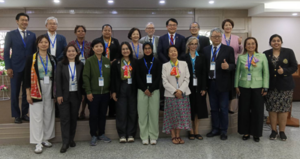 On 25 April 2025, CACCI Deputy Director General Amador Honrado traveled to Bangkok to join the 2-day Conference of Non-Gonverment Organizations' (NGOs) in Consultative Relationship with the United Nations (CoNGO). The 2-day conference comprised several meetings, presentations, and panel discussion of issues of great importance to CACCI and its members, some of which are explained as follows.
On 25 April 2025, CACCI Deputy Director General Amador Honrado traveled to Bangkok to join the 2-day Conference of Non-Gonverment Organizations' (NGOs) in Consultative Relationship with the United Nations (CoNGO). The 2-day conference comprised several meetings, presentations, and panel discussion of issues of great importance to CACCI and its members, some of which are explained as follows.
Background
The Conference of NGOs in Consultative Relationship with the United Nations (CoNGO) is an international organization of non-government organizations granted consultative status under the United Nations. Founded in 1948, CoNGO endorses the goals and values enshrined in the United Nations Charter, and is a strong advocate for multilateralism to resolve global political, environmental, health and other threats. It encourages NGOs around the world to cooperate with the United Nations to promote and support its work and to draw civil society into partnership with the world body. CACCI has been a member of CoNGO since 1981.
Launched in 2017, the CoNGO Regional Committee in Asia-Pacific (RCAP) aims to facilitate Asia-Pacific NGOs’ participation in all UN and CoNGO activities globally and regionally. It cooperates with UN ESCAP and other UN bodies and agencies in Asia and the Pacific, and promotes better cooperation among CoNGO members as well as other civil society organizations in Asia-Pacific.
CoNGO has organized an RCAP Session in the past seven years generously hosted by Siam University. These sessions provide members an opportunity to strengthen regional solidarity and understanding, to exchange experience in crucial Sustainable Development and related areas, and to build new and invigorating partnerships. RCAP meeting is always held during the week of the Plenary Session of the United Nations Economic and Social Commission for Asia and the Pacific (ESCAP) to encourage accredited NGO attendance at both events. RCAP meets on the last days of ESCAP, when the main debates are over, and the plenary is adopting concluding resolutions.
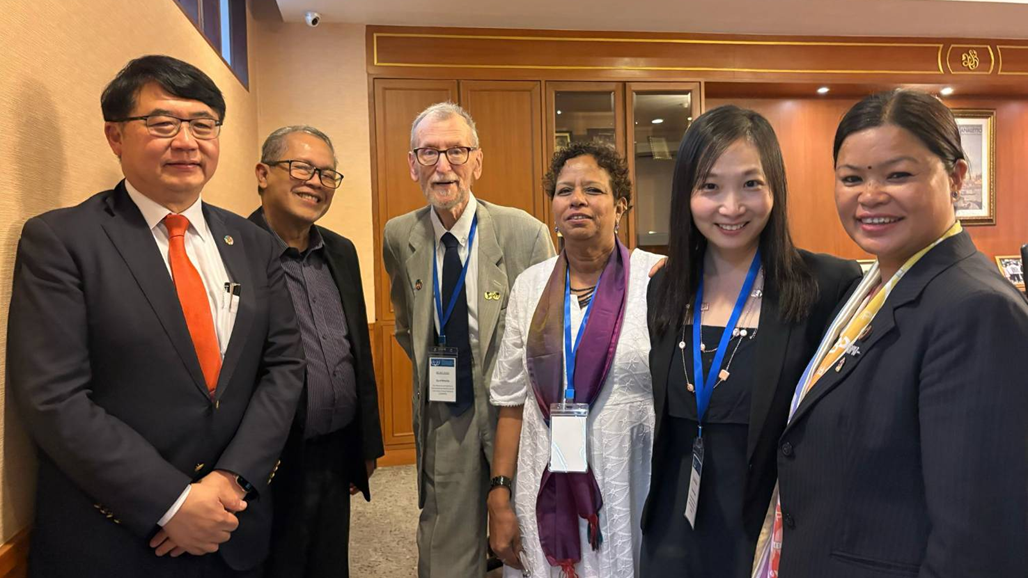
The 2025 RCAP Meeting
This year the ESCAP Plenary took place on April 21-25, so RCAP met at Siam University on April 25 and April 26. The 2025 RCAP meeting had two main features: The first was an analysis of regional, national or local implementation by Asia-Pacific NGOs/CSOs of the Sustainable Development Goals that are up for review this year at the UN High Level Political Forum (HLPF) to be held in New York on. This year the HLPF theme is "Advancing sustainable, inclusive, science- and evidence-based solutions for the 2030 Agenda for Sustainable Development and its Sustainable Development Goals for leaving no one behind”.
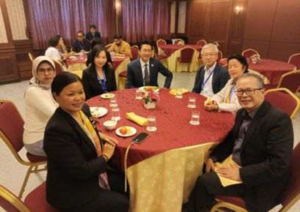 For RCAP 2025, the theme focused on part of this title, namely "ADVANCING SUSTAINABLE, INCLUSIVE, SCIENCE- AND EVIDENCE-BASED SOLUTIONS FOR THE SUSTAINABLE DEVELOPMENT GOALS". The five SDGs highlighted this year are SDG 3 (Good Health and Well-being); SDG 5 (Gender Equality); SDG 8 (Decent Work and Economic Growth); SDG 14 (Life below Water); and SDG 17 (Partnerships for the Goals).
For RCAP 2025, the theme focused on part of this title, namely "ADVANCING SUSTAINABLE, INCLUSIVE, SCIENCE- AND EVIDENCE-BASED SOLUTIONS FOR THE SUSTAINABLE DEVELOPMENT GOALS". The five SDGs highlighted this year are SDG 3 (Good Health and Well-being); SDG 5 (Gender Equality); SDG 8 (Decent Work and Economic Growth); SDG 14 (Life below Water); and SDG 17 (Partnerships for the Goals).
Asia-Pacific NGOs/CSOs were invited to submit a report summarizing their implementation activities on all or any of the five SDGs mentioned above. The reports focused on illustrating, by on-the-ground examples, your organization’s experience, challenges and successes in "Advancing sustainable, inclusive, science- and evidence-based solutions for the Sustainable Development Goals". The purpose of this exercise was to illustrate for other NGOs and for governments how national and local NGOs implement the SDGs.
The second feature of RCAP 2025 was an Open International Panel on the same subject, namely ADVANCING SUSTAINABLE, INCLUSIVE, SCIENCE- AND EVIDENCE-BASED SOLUTIONS FOR THE SDGs. The Panel was complementary to the written reports from grassroots perspectives, in that it covered academic, scientific and private sector research, and looked towards the future of the SDGs and the issues still to be resolved internationally and nationally to reach implementation by 2030.
The RCAP 2025 was attended by 24 representatives from 7 NGOs, including CACCI,
Taiwan Creative Economy Association, International Federation of Business and Professional Women, STUF United Fund, Taiwan Sport Forward Association, Soka Gakkai International, Environment and Development Organization, and Servas International.
Day One (April 25)
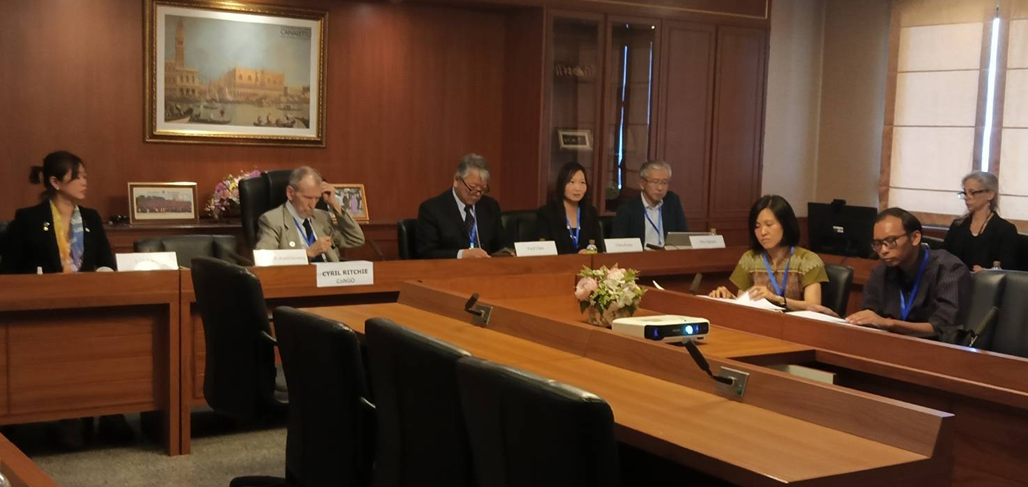
Day One of the 2025 RCAP meeting started with a pre-recorded video of the Welcome Statement by Pornchai Mongkhonvanit, President of Siam University. In his Statement, President Pornchai warmly welcomed the participants to Bangkok and to Siam University. He underscored the importance of RCAP for its role in facilitating Asia-Pacific NGOs’ participation in all UN and CoNGO activities globally and regionally, and in promoting stronger collaboration among CoNGO members as well as other civil society organizations in Asia-Pacific. He reiterated the continued strong support of Siam University in helping RCAP and CoNGO achieve these objectives, and offered the resources of the University in providing assistance to CoNGO members in their information exchange activities.
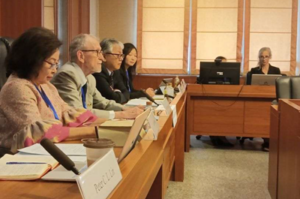 CoNGO First Vice President Cyril Ritchie thereafter delivered His Opening Statement. Mr. Ritchie first gave an overview of the history and general functions of RCAP in relation to CoNGO. He then outlined some of the sombre features that currently serve as a backdrop to Asia-Pacific civil society’s unending advocacy and activism towards achieving a more just world. These include the pervasive nature of sexism, harassment and violence against women in parliaments across the Asia-Pacific region, including an alarming increase in online gender-based violence. He also mentioned that the Asia-Pacific Region is not free of the authoritarianism that underpins governmental measures to limit civil society space, including to restrict freedoms of expression and of association. These factors affect in one way or another the implementation of - indeed the understanding of - the Sustainable Development Goals, Mr. Ritchie said.
CoNGO First Vice President Cyril Ritchie thereafter delivered His Opening Statement. Mr. Ritchie first gave an overview of the history and general functions of RCAP in relation to CoNGO. He then outlined some of the sombre features that currently serve as a backdrop to Asia-Pacific civil society’s unending advocacy and activism towards achieving a more just world. These include the pervasive nature of sexism, harassment and violence against women in parliaments across the Asia-Pacific region, including an alarming increase in online gender-based violence. He also mentioned that the Asia-Pacific Region is not free of the authoritarianism that underpins governmental measures to limit civil society space, including to restrict freedoms of expression and of association. These factors affect in one way or another the implementation of - indeed the understanding of - the Sustainable Development Goals, Mr. Ritchie said.
However, he expressed his hopes that RCAP 2025 will help members move forward along paths of cooperation and implementation, and pledged CoNGO’s full engagement in members’ collective efforts to “achieve a more just world where no-one will be left behind.
The Opening Statement by Mr. Ritchie was followed by individual presentations of representatives who earlier submitted reports that illustrated their organization’s experience, challenges and successes in "Advancing sustainable, inclusive, science- and evidence-based solutions for the Sustainable Development Goals". The presenting organizations included the following:
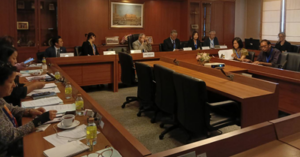 (a) CACCI – Deputy Director-General Amador Honrado reported on the Asia-Pacific Green Alliance (APAC-GA) Initiative of CACCI and the Singapore Manufacturing Federation which falls under SDG 17 (Partnerships for the Goals). Mr. Honrado reported that the APAC-GA is a response to the fragmented sustainability landscape that countries worldwide currently navigate, with many countries encountering diverse standards, regulations, and approaches towards sustainability. He said that this diversity, while reflective of local priorities and contexts, creates a significant challenge, especially for SMEs. APAC-GA’s vision and mission, therefore, is to unify sustainability reporting across the Asa-Pacific economies and to empower companies, particularly SMEs, with simplified actionable sustainability tools.
(a) CACCI – Deputy Director-General Amador Honrado reported on the Asia-Pacific Green Alliance (APAC-GA) Initiative of CACCI and the Singapore Manufacturing Federation which falls under SDG 17 (Partnerships for the Goals). Mr. Honrado reported that the APAC-GA is a response to the fragmented sustainability landscape that countries worldwide currently navigate, with many countries encountering diverse standards, regulations, and approaches towards sustainability. He said that this diversity, while reflective of local priorities and contexts, creates a significant challenge, especially for SMEs. APAC-GA’s vision and mission, therefore, is to unify sustainability reporting across the Asa-Pacific economies and to empower companies, particularly SMEs, with simplified actionable sustainability tools.
As part of efforts to promote the APAC-GA, CACCI President Peter McMullin AM commissioned a study aimed at getting a better understanding of the needs and challenges faced by SMEs in transitioning their businesses or organizations toward netzero goals. CACCI and SMF also jointly organized a webinar to introduce APAC-GA to CACCI member chambers – highlighting the benefits that they and their respective businesses can derive from their involvement in it - and to encourage them to take an active participation in the initiative.
(b) Soka Gakkai International – Representative to the UN Mr. Hiro Sakurai reported that the focus areas of work of Soka Gakkai International (SGI) include peace, disarmament, environment and sustainability, human rights education, gender equality and women’s empowerment and humanitarian relief.highlighted the engagement of in the implementation of SDGs 3 (Good Health and Well-being); SDG 5 (Gender Equality); and SDG 17 (Partnerships for the Goals). These include activities such as Combating Plastic Pollution in India, Online Cinema Series on Persons with Disabilities and their Families; Supporting Vulnerable Community Members in Singapore, Women-led initiatives in Japan, India, Singapore; Partnership for faith based organizations in Asia-Pacific region; and Partnerships for Risk Reduction in Asia-Pacific region, among others.
(c) The Pan-Pacific South East Asian Women’s Association – First Vice President Neelima Basnet explained that BPW International is one of the most influential international networks of business and professional women with affiliates in over 100 countries in five continents. Its members include influential women leaders, entrepreneurs, business owners, executives, professionals and young business and professional women. She reported on her organization’s various activities in various countries (Japan, Canada, Malaysia, Taiwan, Thailand, New Zealand, Fiji, USA, and Maui) in implementing SDG 3 (Good Health and Well-Being); SGD 5 (Gender Equality), SDG 8 (Decent Work and Economic Growth); SDG 14 (Life Below Water); and SDG 17 (Partnerships for the Goals).
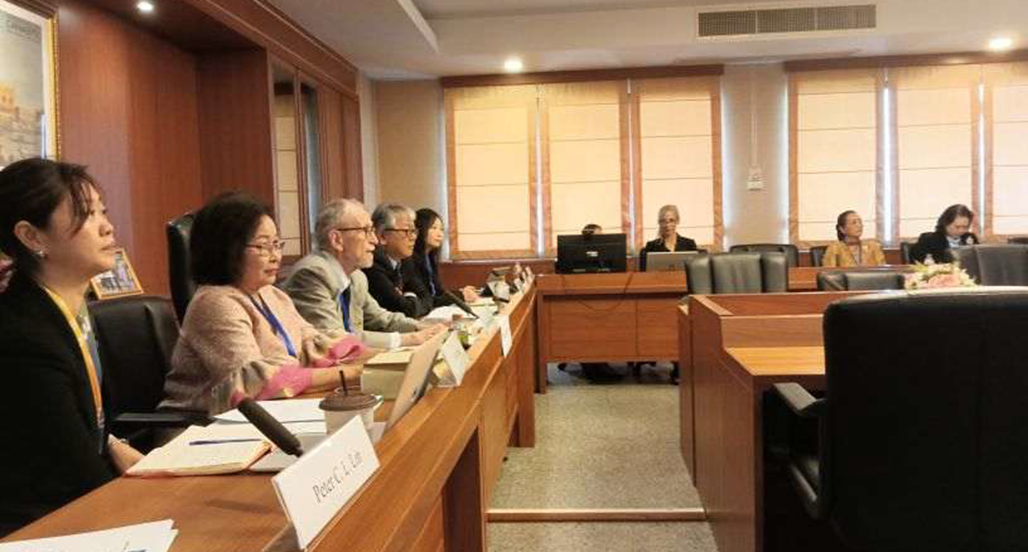
(d) Taiwan Sport Forward Association –Intern Ms. Maria Julian said that the Taiwan Sport Forward Association was established to support and empower disadvantaged children, young, and female athletes, and to promote gender equality in sports and sports diplomacy. Her presentation focused on the topic “What Sports Can Do for International Relationships”, highlighting how it impacts youth by bridging cultural gaps, language learning, cultivating empathy, building relationships, and creating change.
She also elaborated on how Taiwan Sport Forward Association (TSFA) is making global impact, for example through such activities aimed at empowering female athletes and implementing safe sports by keeping sports a safe environment for all. She also outlined what TSFS teaches to young athletes and how Taiwan can help in achieving the goals of safe sports in the broader Asa-Pacific region.
(e) STUF United Fund Asia Pacific Center – President Peter Lin gave explained that STUF United Fund is a non-profit organization registered in the U.S. that supports international charity work. With the core values of STUF (Share, Trust, Unity, and Family), the organization focuses on the areas of Disaster Relief, Culture and Education,
Public Health, and Environmental Protection. It supports projects around the world and aims to become an organization that helps consolidate and distribute resources to ensure a more powerful social impact. It encourages the corporate sector to participate in charity causes to jointly create more effective changes in the global society and encourage youth to join the global community’s efforts and activities for the betterment of society. Dr. Lin reported that in the past year, his organization has conducted various philanthropic projects and participated in United Nations-related activities, achieving remarkable results on a global scale.
Day Two (April 26)
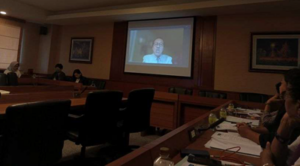 Day Two opened with a Statement delivered via Zoom from New York from CoNGO President Mr. Liberato Bautista. Mr. Bautista outlined the history of RCAP, and its Terms of Reference, which is mainly to facilitate Asia-Pacific NGOs’ participation in all UN and CoNGO activities regionally and globally. He thanked the important role played by First Vice President Mr. Cyril Richie and Senior Associate Ms. Sheila Bordier in the functioning and activities of CoNGO and the RCAP, as well as the officers and staff of Siam University led by its President Mr. Pornchai Mongkhonvamit for regularly hosting the annual meeting of RCAP in Bangkok.
Day Two opened with a Statement delivered via Zoom from New York from CoNGO President Mr. Liberato Bautista. Mr. Bautista outlined the history of RCAP, and its Terms of Reference, which is mainly to facilitate Asia-Pacific NGOs’ participation in all UN and CoNGO activities regionally and globally. He thanked the important role played by First Vice President Mr. Cyril Richie and Senior Associate Ms. Sheila Bordier in the functioning and activities of CoNGO and the RCAP, as well as the officers and staff of Siam University led by its President Mr. Pornchai Mongkhonvamit for regularly hosting the annual meeting of RCAP in Bangkok.
He further informed the meeting that his term as CoNGO President will end in October but he will remain committed to the objectives of CoNGO and RCAP and will extend his support to both whenever needed. He pointed out that the role of CoNGO is currently facing challenges in the face of evolving geo-political landscape and with multilateralism on a flax, undermining human rights and other areas of concern to CoNGO. He therefore called on CoNGO members, especially those in Asia-Pacific, to be more vigilant and to make their voices heard in UN bodies and agencies in the region.
Mr. Bautista’s Statement was followed by the Open International Panel that featured various presentations by RCAP representatives on the theme “Advancing Sustainable, Inclusive, Science- and Evidence-Based Solutions for the Sustainable Development Goal”. Their presentations covered the general themes of (a) academic, scientific, and private sector research and innovation, and (b) The future of SDG implementation towards the Agenda 2030 target.
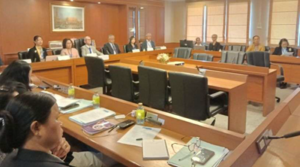 The panel discussants included the following:
The panel discussants included the following:
- Ms. Clara Kwan, Chief Sustainability Officer, Singapore Manufacturing Federation, and in-charge of the Asia Pacific Green Alliance Initiative.
- Ms. Chanita Rukspoolmuang, Vice President, Siam University.
- Mr. Fred Chen, President Taiwan Creative Economy Association.
- Ms. Lisa Fong, Representative to UNESCAP, International Federation of Business & Professional Women.
- Mr. Peter Lin, Chairperson, STUF United Fund – Asia Pacific Center.
- Mr. Hiro Sakurai – Representative to the UN, Director, Office for UN Affairs, New York, Soka Gakkai International.
After the Panel discussion, a closed meeting of the RCAP Steering Committee was held with Mr. Cyril Rithie presiding. The meeting mainly assessed the proceedings of the two-day event, and exchanged opinion on how to further improve on the meeting agenda as well as how to secure a more active and participative response from the attendees in future gatherings. Mr. Honrado was invited by Mr. Ritchie to participate in the meeting as an observer.





